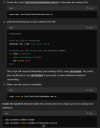The #17 solution is not perfect, I have multiple VMs, Some VMs hibernate successfully, but some don't. It seems that the script on #17 and PVE shutdown process both execute in parallel.
So I use custom command to do this manually.
I created a script file reboot.sh
Everytime I want to reboot, I execute this script in PVE console.
The VM 100 is windows operating system with QEMU Guest Agent installed, using "guest cmd" to hibernate is a better way.
So I use custom command to do this manually.
I created a script file reboot.sh
Code:
#!/bin/bash
qm suspend 102 --todisk
qm suspend 101 --todisk
qm guest cmd 100 "suspend-disk"
rebootEverytime I want to reboot, I execute this script in PVE console.
The VM 100 is windows operating system with QEMU Guest Agent installed, using "guest cmd" to hibernate is a better way.
Last edited:



